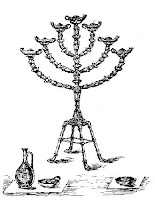Making Sense out of Leviticus #13
Today's reading: Leviticus 24-25.

Chapter 24 includes further instructions for the two pieces of furniture of the Tabernacle pictured above. The first instruction is for the oil that was to be in the lamp stand and the care of that oil. The lamp stand was to be taken care of continually. (Every morning and every evening by High Priest). The oil was to be clear from pressed olives. This was to burn continually in the Holy Place (outer room) of the Tabernacle and was to provide light for three reasons: it was to burn before the Lord, it was to give light so the glory of all the furniture pieces could be seen, and it was to give light so the priests could see in this room. This was pure olive oil so it would burn well and without smoke. This symbolically was the light of the Holy Spirit in the heart of the believer - so the believer can understand and "see" the Word.
The bread on the Table of Shewbread (or simply The Table) was to be made of the finest flour and oil. There were twelve loaves - one for each tribe. This illustration shows them stacked up and down, many believe they were stacked side by side, with all showing equally. Either way, they were unleavened wheat bread stacked before the Lord every Sabbath. They remained there until the next Sabbath at which time they were replaced with fresh ones. The week-old ones were then eaten in the Holy Place. The Table itself was about as tall as our coffee tables. One would need to bend to partake and minister here. Symbolically the Table and its ever present bread represent the provision of the Lord(in all areas - especially emotional well being), continually present before the Lord and His servants. To eat, to minister one must bend or go to their knees.
The Last part of the chapter is uncomfortable for us. However, the standard God had set for the Israelites was high in regard to the words of their mouths. Here it is underlined and enforced. It should be noted that for the entire history of the nation of Israel (both united and divided) there were no prisons. There were "cities of refuge" to which an offender could flee until trial, but no prisons. Retribution was according to law and swift. It did its job to control the nation. Our mouths are to be those of praise.
Chapter 25 is a wonderful breath of fresh air as it deals with the Sabbath and its years. Every 7th day was a day of rest, every 7th year was a year of rest, every 49th year was a year of rest and every 50th year was a year of rest. (Yup - two years in a row at least once in a normal lifetime). We do need to get the picture! The Lord loves celebrations (The Feasts) and He insists upon rest. This chapter sets for the promised provisions for the days, weeks and years of rest that was to punctuate their lives.
Years ago, I spent many months seeking the Lord to understand what the Sabbath was really all about. Of course, it was instituted by God after creation, so I understood the importance of physical rest, but also understood that our God was saying something beyond that all through the Old Testament. In the New Testament, the Sabbath is referred to, but never in commandment form. So I was curious. When the answer came, I was on my face praying to the Lord and seeking His heart, when all of a sudden, I knew. Of course! The Sabbath, its days, weeks, and years all were prophetic statements of what the Christ would bring us in relationship. "Come to me, all you who are weary and burdened, and I will give you rest. Take my yoke upon you and learn from me, for I am gentle and humble in heart, and you will find rest for your souls. For my yoke is easy and my burden is light." Matt. 11:28-30 NIV
This does not relieve us of the need to physically rest. When we choose to rest, we learn to hear Him much more clearly. His call is to come and "be." What a marvelous Savior!
Tomorrow's reading: Leviticus 26 & 27,


Comments